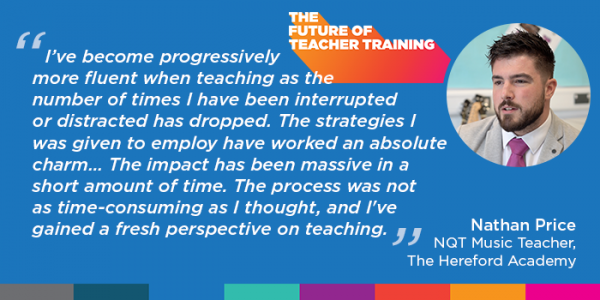- Blogs
- 2 Minute Read



What schools need to know about the Future of Teacher Training – our findings from UCET 2019 and the ITT Core Content Framework
Every November the leading teacher training universities in the UK come together for their annual conference, UCET.
This year’s conference was especially important – as well as discussing the imminent Early Career Framework (ECF) for teachers who are already practicing the profession, the UK Government has just released the new Initial Teacher Training ITT Core Content Framework for teachers still in training.
The aim of these two changes is to provide all teachers with at least three years of high quality, research-based training at the start of their career – training that aims to ensure that more teachers stay for longer, teach better and thrive in the profession.
But these changes rely on the support of schools, as well as changes in universities and other training providers.
As a key supporter of UCET, ONVU Learning was able to talk to the experts who have been involved in these changes – including Professor Sam Twiselton, OBE of Sheffield Hallam University (SHU) who led the ITT review and Mr James Noble-Rogers, Executive Director of UCET itself. Below we set out what these changes will mean for schools – and in particular the growing importance of mentors and ‘expert colleagues’ in schools.
New Challenges for Schools
1. Answering deeper questions from trainees. Trainee teachers will be expected to research how schools are addressing issues beyond the classroom – for example how curriculum choices are made and how students are helped to master new ideas over longer time periods.
2. A greater role for modelling from ‘expert colleagues’ and mentors. While there is still a significant place for self-reflection and observation, trainee teachers will be expected to observe and learn from colleagues. Professor Rachel Lofthouse told us that ‘the need for mentoring has never been greater’.
Above: Sam Twiselton James Noble-Rogers on the potential impact of the Initial Teacher Training Core Content Framework
3. Letting trainee teachers observe contrasting school systems. There are an increasing number of different approaches from schools to issues such as behaviour, assessment and curriculum design. Delegates were keen that teachers were able to explore and analyse these in a professional way, rather than being ‘apprenticed’ to one way. This will also allow trainee teachers to observe schools that exemplify all of the Teaching Standards that underpin both the ECF and ITTCCF.
4. Engaging with training providers. Schools that ‘fit’ well with universities and other training providers and offer excellent and seamless training across the new programmes will be well-placed to attract new teachers to their schools. This could be a key differential for schools in the current ‘teacher recruitment crisis’.
Our technology and coaching solutions are designed to provide secure, fast and effective sharing of real lessons. By working closely with our partner schools and a good mix of NQTs , schools have found our solutions to revolutionise training in several ways:
The impact of video-based sharing and coaching can be dramatic.
NQT Nathan Price works at The Hereford Academy in the UK. He was able to share his lessons with ONVU Learning’s Teacher Development Lead, Dr Sean Warren. After they had been working together for six weeks, he said:


The School of the Future Guide is aimed at helping school leaders and teachers make informed choices when designing the learning environments of the future using existing and upcoming technologies, as they seek to prepare children for the rest of the 21st century – the result is a more efficient and competitive school.
KEEP IN TOUCH WITH ONVU LEARNING AND RECEIVE THE LATEST NEWS ON EDTECH, LESSON OBSERVATION, AND TEACHER TRAINING AND DEVELOPMENT.